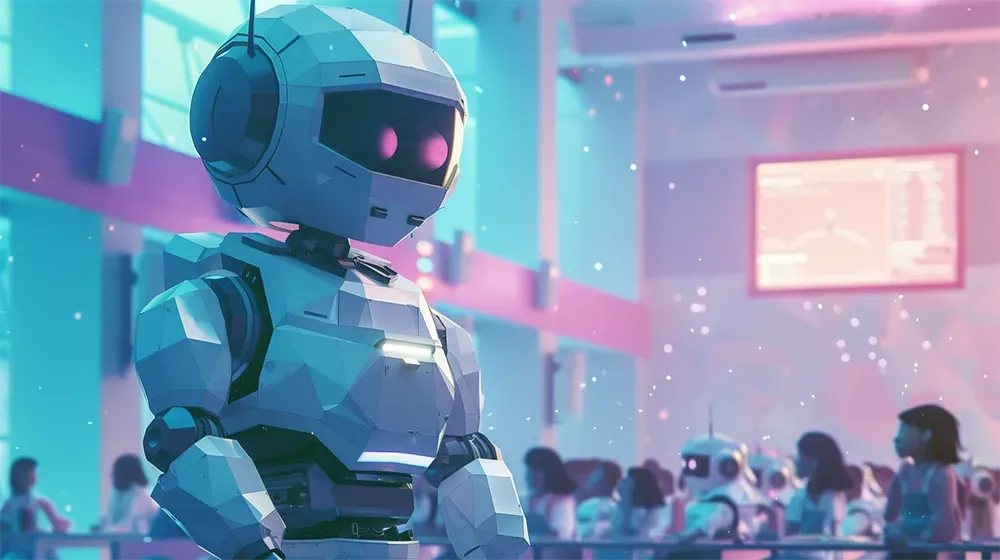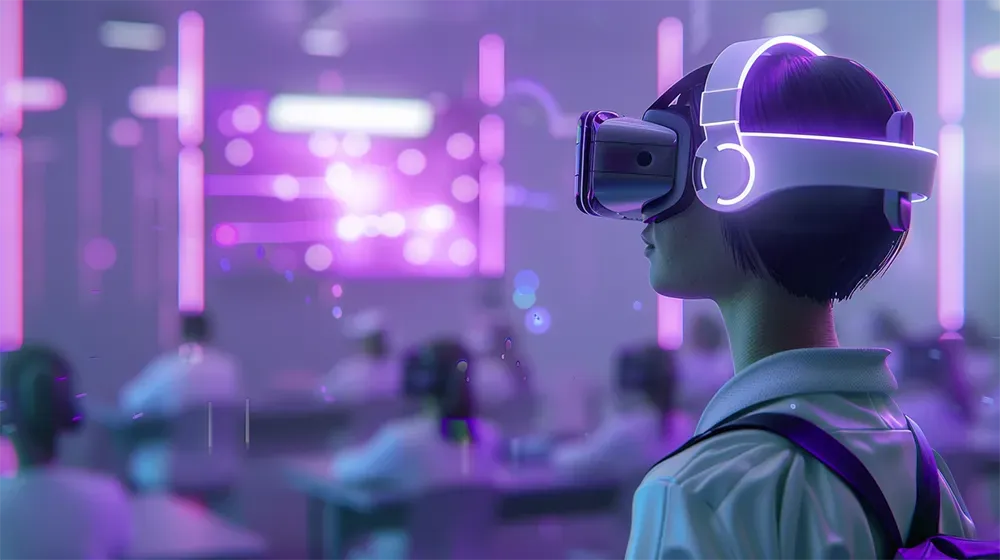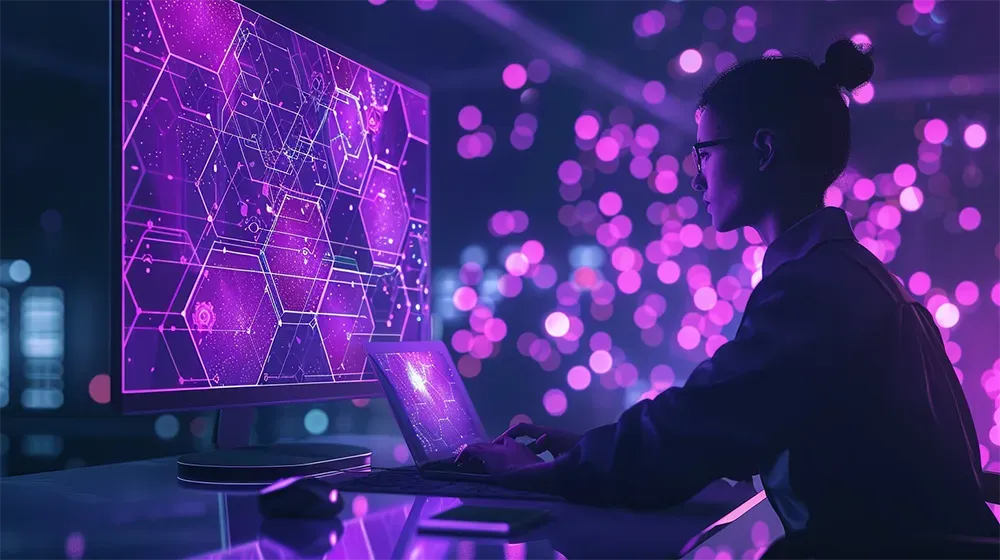Learning 2.0: The Rise of AI Tutors

For the past century, education has remained fundamentally unchanged. Rows of desks, a teacher at the front, and a blackboard filled with chalk—this has been the enduring image of the classroom. Despite seismic shifts in technology and society, our educational institutions have largely preserved a static model, focused more on dispensing knowledge than engaging with the transformative tools at our disposal. However, as we stand on the brink of a new era marked by rapid technological advancements, it is becoming increasingly clear that clinging to outdated pedagogies is no longer viable.
The call for change is about adopting new technologies and rethinking the essence of teaching and learning. The school of tomorrow will likely be characterised not by resistance to change but by an embrace of AI tutors—intelligent systems capable of delivering personalised education tailored to the needs and pace of each student. These AI tutors represent more than just an incremental adjustment; they fundamentally reimagine how education can be structured to better prepare students for a world that will look fundamentally different when they graduate.
The promise of AI tutors is not merely to maintain the status quo with greater efficiency but to revolutionise the educational landscape, making learning a more adaptive, inclusive, and transformative experience, regardless of language, expertise, and background. Let’s dive into the transformative potential of AI tutors.
Old School vs. New Cool

The integration of AI into educational settings is a revolutionary shift from traditional learning methodologies of the past. Today's students, already equipped with AI tools such as ChatGPT, navigate their educational journeys differently, leveraging AI for tasks ranging from simple queries to complex assignment help.
While generative AI tools enhance the learning process, we are just at the beginning of a paradigm shift where we move from passive use of digital tools to active participation of these AI tools in your learning journey.
However, as AI technologies become more embedded in our educational fabric, are we merely simplifying learning or enhancing it, enabling a deeper, more diverse exploration of knowledge beyond traditional boundaries?
The AI Tutor (R)Evolution

AI tutors represent a transformative shift in educational methodologies, leveraging the latest advancements in artificial intelligence to tailor learning experiences to the individual needs of each student. These AI agents are more than just repositories of information; they are dynamic, interactive systems capable of adapting in real time to students' learning pace and style.
By continuously analysing data on students' performance, AI tutors can identify areas of strength and weakness, allowing for the creation of personalised learning paths that focus on areas requiring improvement while reinforcing areas of competence.
This personalisation extends to how content is delivered. Depending on a student's learning preferences—be it visual, auditory, or kinaesthetic—AI tutors can present information in the format that is most likely to facilitate comprehension and retention.
Beyond individualised learning, AI tutors can significantly alleviate the administrative burden on educators and offer educational support. By automating tasks such as grading and providing basic feedback, teachers can dedicate more time to designing engaging, complex learning experiences and offering one-on-one support where it is most needed. This shift can enhance the teacher-student relationship, transforming teachers into mentors who guide students through their educational journey rather than merely convey information.
The Benefits of AI Tutors

The advent of AI tutors heralds a significant leap forward in educational technology, offering a suite of benefits that cater to the diverse needs of students across the globe. These sophisticated systems are designed to enhance the learning experience on multiple levels.
Personalised learning is at the forefront of the advantages offered by AI tutors. Unlike traditional one-size-fits-all educational models, AI tutors analyse individual student data to tailor lessons according to each student's pace, learning style, and areas of interest. Students who grasp concepts quickly can be challenged further, while those who need more time can receive it, ensuring that no student is left behind or unengaged.
Immediate feedback is another cornerstone of the AI tutoring experience. In traditional learning environments, feedback can often be delayed, sometimes days or weeks after completing an assignment. This delay can hinder learning, as students may struggle to connect the feedback with their specific actions or misunderstandings. AI tutors, by contrast, provide real-time feedback, allowing students to immediately understand their mistakes, learn the correct concepts, and apply them while the material is still fresh in their minds. This immediacy accelerates the learning process and enhances student engagement and retention.
Accessibility to quality education is perhaps the most transformative aspect of AI tutors. Geographic location, socioeconomic status, and resource availability are significant barriers to education for many students worldwide. AI tutors can bridge this gap by providing high-quality, personalised education to students regardless of where they are. This democratisation of education has the potential to level the playing field, offering every student the opportunity to learn, grow, and succeed.
Moreover, the flexibility of AI tutors means that learning can happen anytime, anywhere. Students can engage with their AI tutor outside of traditional school hours, making learning more adaptable to each student's life and schedule. This flexibility is particularly beneficial for students who may have other responsibilities, such as part-time jobs or family care, allowing them to continue their education without sacrificing other areas of their lives.
At Walden University and Georgia Tech institutions, AI tutors transcend traditional education boundaries, offering students 24/7 support in complex subjects like sociology and early childhood education. These AI systems, powered by robust machine learning algorithms, adapt and evolve by ingesting course material and student interactions. This continuous learning allows AI tutors to refine their responses and improve their teaching effectiveness.
AI tutors excel in delivering customised content and assessments, enabling a deeper and more effective learning experience. They combine the advantages of human tutors—personal attention and adaptability—with the scalability and data-driven precision of advanced technology. As these tutors evolve, they promise to supplement and transform educational methodologies, making learning more engaging and accessible.
Meet Khanmigo: Revolutionising Education One Interaction at a Time
Sal Khan, founder of the Khan Academy, is a prominent advocate for educational technology. For years, he has envisioned a future where AI tutors could dramatically elevate student achievement, mirroring the lofty aspirations of a 1984 study that suggested tutoring could propel students to the top of their class.
With the rise of Large Language Models, the Kahn Academy decided to take that approach to the next level by introducing the AI tutor Khanmigo, which aims to foster a deeper understanding and engagement in learning.
Khanmigo is redefining educational interaction by harnessing AI to create an always-on, personalised learning environment for just $4 a month. Unlike conventional AI tools that spoon-feed information, Khanmigo challenges users to engage deeply with content, enhancing critical thinking and problem-solving skills.
This tool isn't just about giving the right answers; it's about fostering a learning process that encourages students to discover answers through guided reasoning. With features like real-time feedback on coding and the ability to customise its appearance, Khanmigo isn't just a tool—it's a learning partner that does so across borders.
Take Sultana's story, for example, a young girl from Afghanistan who, barred from traditional schooling by the Taliban, turned to Khan Academy’s AI tools to pursue her dream of studying quantum computing in the US This story isn't just inspiring—it's a testament to the transformative power of AI in democratising education. Sultana’s story happened even before the launch of Khanmigo, so imagine what opportunities arise for children worldwide when AI tutors become commonplace.
Challenges of AI Tutors

While some teachers see potential in AI to reduce workload and enhance lesson planning, others caution that technology alone cannot address deeper educational challenges, such as student motivation and equity of access or teaching typical human attributes. As a result, as universities begin to weave this digital fabric into their core operations, the balance between technological assistance and critical human attributes like creativity and ethical reasoning must be scrutinised.
The heart of the debate remains whether AI tutors could eventually replace the nuanced guidance of human mentors. While AI offers personalised learning experiences and makes education more accessible through interactive environments, it lacks the ability to nurture critical thinking and emotional intelligence—the very essence of human interaction in education.
Moreover, as these systems bring the curriculum to students' fingertips, concerns about data privacy, the risk of deepening the digital divide, and the potential loss of critical human educational interactions loom large. Within the coming years, while AI tutors are still evolving, we should caution against overreliance on these digital tutors due to risks of inaccuracies and the model's inherent limitations. After all, AI's capacity to understand and adapt to individual learning needs is still in its infancy, leading some experts to predict that AI tutors won't be fully functional for decades, if ever.
As AI evolves, the educational sector is urged to recalibrate expectations, recognising AI's role as a supportive assistant rather than a standalone tutor. Until we have advanced autonomous AI tutors, rigorous testing and a blended approach where AI supports rather than supplants human interaction can ensure educational tools are both innovative and safe.
Final Thoughts

AI tutors represent a paradigm shift in education, offering personalised learning, immediate feedback, and unparalleled accessibility. These digital platforms have the potential to make education more inclusive, effective, and aligned with the needs of the 21st-century learner. As we continue to refine and develop AI technologies, the promise of a more educated, equitable world becomes increasingly attainable.
While some teachers see potential in AI to reduce workload and enhance lesson planning, others caution that technology alone cannot address deeper educational challenges such as student motivation and equity of access. As AI reshapes learning, the essential question remains: will technology serve as a great equaliser, or will it become another layer of stratification in education and replace foundational educational values with algorithmic interactions?
Images: Midjourney





